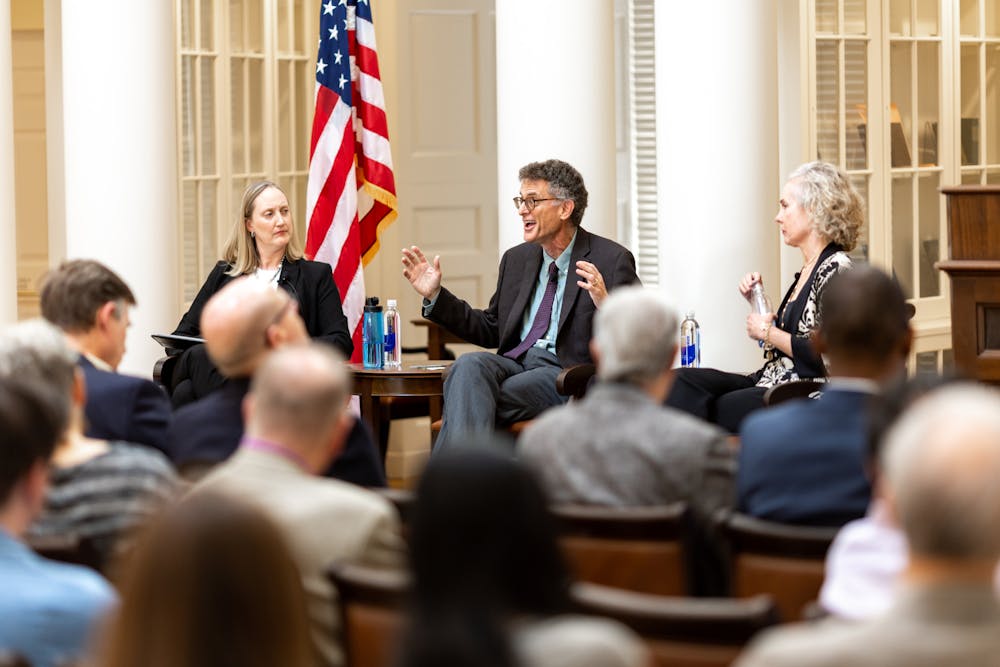Students, faculty and community members gathered inside the Rotunda Thursday afternoon for an event entitled “Democracy Dialogues,” a moderated discussion hosted by the University’s Miller Center and Karsh Institute of Democracy. Speakers discussed topics such as academic freedom of speech across American universities and the broader preservation of civil discourse at large.
Dr. Jennifer Ruth, senior associate dean at Portland State University and professor of film, and Dr. Jonathan Zimmerman, Judy and Howard Berkowitz education professor at the University of Pennsylvania, spoke at the event. The discussion was moderated by Dr. Leslie Kendrick, director of the Center for the First Amendment at the University and Elizabeth D. and Richard A. Merrill professor of Law.
In her speech, Ruth emphasized a pragmatic, policy-centric approach, advocating for academic freedom committees to address free speech limits, especially for non-tenured professors. She proposed academic freedom committees, inspired by her work with the American Association of University Professors, as a way to regulate necessary censorship in the event of controversial speech. These committees would be tasked with ensuring academic freedom and due process in university settings.
“Faculty must be evaluating each other, and faculty must hold faculty accountable,” Ruth said. “Is your work within your field? Does it make sense? Or are you making claims…to culture war rhetoric that doesn’t actually fit or make sense within your field?”
Throughout the event, both speakers referenced culture wars as a point of political contention in modern society. Culture wars are often described as political conflicts dealing with morality, lifestyle and education.
While Ruth focused on free-speech committees, Zimmerman took a broader approach and focused on ideology, highlighting political hypocrisy and a lack of consistency. Zimmerman agreed with the necessity of Ruth’s academic freedom committees but also suggested that unjust censorship resulting from culture wars was the fault of both the political left and right.
“I think those of us on the left have to be honest about this question [of censorship],” Zimmerman said. “If we pretend that there's just one side to this culture war, we're actually fueling it.”
Zimmerman has written multiple books about the culture war in America, such as “Whose America: Culture Wars in the Public Schools” and “Campus Politics: What Everyone Needs to Know.” Similarly, Ruth has cowritten a book about the limits of the First Amendment, entitled “It’s Not Free Speech: Race, Democracy, and the Future of Academic Freedom.”
Both speakers framed their stances in the context of Hamline University’s dismissal of former adjunct professor Dr. Erika López Prater earlier this year, a decision they both deemed unjust.
López Prater’s professorship contract was not renewed after she showed students a 14th century painting depicting the Prophet Muhammad. Looking upon any visual depictions of the Prophet is considered a violation of the Islamic faith to some Muslims, but López Prater maintained that she included proper warnings on the syllabus and before showing the piece itself.
The speakers’ proposed solutions to the larger issue differed significantly. Ruth maintained that an academics freedom committee might not prevent this type of censorship but would nonetheless make it more difficult for university administrations to dismiss faculty due to fear or political pressure.
“We're looking for ways for faculty to evaluate faculty, rather than capricious decisions by administrators, overreactions from students or alumni and parents complaining,” Ruth said.
Zimmerman took issue not only with López Prater's dismissal but also with the recent controversy surrounding a panel hosted by the non-profit advocacy group Heterodox Academy. The panel, titled “Let’s Talk About Sex Baby: Why Biological Sex Remains A Necessary Analytic Category in Anthropology,” was canceled in November due to its alleged transphobic nature. He claimed that this kind of censorship inevitably goes both ways.
“On my campus, I've heard lots of people on the left say that we have to rein in hate speech and all this terrible rhetoric…and if you're the sort of person who was walking around campus talking about the need to expel hate speech…on the right, it’s exactly the same thing,” Zimmerman said.
Ruth argued that aspects of the culture war mentioned by Zimmerman were, to a degree, sensationalized by the media. As the talk concluded, Ruth shifted the focus from sensationalization to the importance of actively fostering open, safe and understanding spaces for civil discourse on college campuses.
“Who has the authority to decide what you think and what you can't say? That’s what academic freedom is… There are a lot of uneven and contradictory aspects of university governance…so [as for] the question about where you draw the line — it has to be your peers,” Ruth said.
Zimmerman reiterated his goal of continuously pursuing an open dialogue across the aisle between political parties, even when it is perhaps controversial to do so.
“Speech hurts,” Zimmerman said. “But once you decide that you're going to try to prevent that hurt, you're gonna have a really hard time speaking.”
The Miller Center will be hosting a talk entitled “Future-oriented China-U.S. Relations and Cooperation” Nov. 28. Interested parties are free to register on their website.







